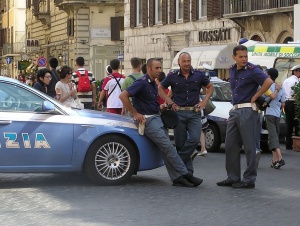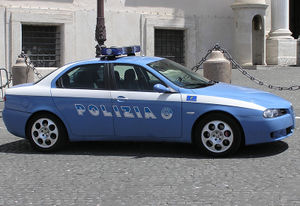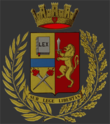Difference between revisions of "Polizia di Stato"
m |
m |
||
| (One intermediate revision by the same user not shown) | |||
| Line 1: | Line 1: | ||
| − | + | {{X}} | |
| − | [[Image:aral1981 copy.png|center| | + | [[Image:aral1981 copy.png|center|110px]] |
| − | |||
| − | |||
[[Image:Lamborghini Polizia.JPG|thumb|right|One of the [[Lamborghini Gallardo|Lamborghini Gallardo]] of the ''Polizia Stradale'']] | [[Image:Lamborghini Polizia.JPG|thumb|right|One of the [[Lamborghini Gallardo|Lamborghini Gallardo]] of the ''Polizia Stradale'']] | ||
| − | |||
[[Image:polizia.di.stato.arp.jpg|thumb|right|''Polizia di Stato'' police in [[Rome]]]] | [[Image:polizia.di.stato.arp.jpg|thumb|right|''Polizia di Stato'' police in [[Rome]]]] | ||
| + | |||
The '''''Polizia di Stato''''' (State Police or PdS) is one of the [[national police]] forces of [[Italy]]. It is responsible for providing general police duties in Italy; patrolling motorways (''[[autostrada]]''), railways, airports, customs (together with the ''[[Guardia di Finanza]]'') as well as certain waterways, and assisting the local police forces. The ''Polizia di Stato'' is a [[civil police]] force, but it is militarily organized. This does not mean that it is a military institution, but its structure is based on the military. The ''Polizia di Stato'' is the principal Italian police force for the maintenance of public security (since it is run directly from the ''Dipartimento della Pubblica Sicurezza'' ([[Department of Public Safety|Department of Public Security]]), and the keeping of public order. It is a police force in contrast to the other main police forces of Italy, the ''[[Carabinieri]]'', which is a [[military police]] ([[gendarmerie]]) force and the ''[[Guardia di Finanza]]'', the Italian customs and border protection police that also falls in the military corps category. | The '''''Polizia di Stato''''' (State Police or PdS) is one of the [[national police]] forces of [[Italy]]. It is responsible for providing general police duties in Italy; patrolling motorways (''[[autostrada]]''), railways, airports, customs (together with the ''[[Guardia di Finanza]]'') as well as certain waterways, and assisting the local police forces. The ''Polizia di Stato'' is a [[civil police]] force, but it is militarily organized. This does not mean that it is a military institution, but its structure is based on the military. The ''Polizia di Stato'' is the principal Italian police force for the maintenance of public security (since it is run directly from the ''Dipartimento della Pubblica Sicurezza'' ([[Department of Public Safety|Department of Public Security]]), and the keeping of public order. It is a police force in contrast to the other main police forces of Italy, the ''[[Carabinieri]]'', which is a [[military police]] ([[gendarmerie]]) force and the ''[[Guardia di Finanza]]'', the Italian customs and border protection police that also falls in the military corps category. | ||
Latest revision as of 08:39, 7 October 2009


The Polizia di Stato (State Police or PdS) is one of the national police forces of Italy. It is responsible for providing general police duties in Italy; patrolling motorways (autostrada), railways, airports, customs (together with the Guardia di Finanza) as well as certain waterways, and assisting the local police forces. The Polizia di Stato is a civil police force, but it is militarily organized. This does not mean that it is a military institution, but its structure is based on the military. The Polizia di Stato is the principal Italian police force for the maintenance of public security (since it is run directly from the Dipartimento della Pubblica Sicurezza (Department of Public Security), and the keeping of public order. It is a police force in contrast to the other main police forces of Italy, the Carabinieri, which is a military police (gendarmerie) force and the Guardia di Finanza, the Italian customs and border protection police that also falls in the military corps category.
Organization
The headquarters of the Polizia di Stato are located in Rome and its chief is referred to as the Capo della Polizia (Chief of Police). The force is organized on a regional and provincial basis, thus every major Italian town or city has a main PdS station called a Questura run by a Questore (the provincial commander). In smaller settlements, a Vice Questore Aggiunto (deputy commander) or Commissario Capo runs the PdS offices. There are also several sub-stations for various districts.
Polizia di Quartiere aims to increasing the police presence and deter crime. Pairs of poliziotti (policemen) patrol areas of major cities on foot. Its critics contend that these efforts are ineffective, as the areas with the greatest concentration of crime are being neglected.

Special Operations
About 24,000 officers, that is almost a quarter of police personnel, work within the Traffic Police (Polizia Stradale), Railroad Police (Polizia Ferroviaria), Post and Telecommunications Police (Polizia Postale) and Border and Immigration Police.
Traffic police
Traffic police patrol the 7,000 kilometers of motorways (autostrada) in Italy and the main highways and arterial roads outside towns. Their duties are the prevention and detection of driving offences, car accident reports, planning and carrying out of services to regulate traffic, providing escorts for road safety, protection and control of the road network, rescue operations and cooperation in the collection of traffic flow data.
Railroad Police
The Railroad police ensure the security of travelers and their belongings on trains and at stations plus the safety and control of dangerous goods. Railroad Police officers patrol, in particular, long-distance and night trains, and at stations in big cities where vagrants often accumulate.

Post and Telecommunications
The Polizia Postale investigates all crimes that use communications as part of its modus operandi. For example, computer hacking, online child pornography, credit card fraud, spreading computer viruses or software copyright violations are areas that the Polizia Postale would investigate.
Immigration and Border Police
To control the flow of migrants into Italy, the Department of Public Security set up the Immigration and Border Police Service, to enforce regulations concerning the entry and stay of aliens in Italy. The service operates at both central and local level with many land, air and maritime border police offices. The service is also responsible for passport control, the issuing of residence permits, as well as the prevention and control of illegal immigration. Although due to the Schengen agreement many borders have or are about to disappear, the division is still present on all borders to do systematic or random checks. In airports the border police is in charge of security and immigration checks.
Mobile Units
A special function of the police are the mobile units of which there are 13 located in the main Italian cities. These can be deployed throughout the country to maintain public order with crowd-control equipment and vehicles or perform rescue services in areas affected by natural disasters. These units employ selected personnel that are specially trained and equipped to endure the physical and psychological stress involved in the performance of their specific tasks.
The PdS’s bomb disposal units, mounted detachments, canine units, air support squadrons and maritime and river police units all fall under the mobile unit HQ.
Anti Terrorism Police
The Anti Terrorism Police is a specialist body made up of the Central Directorate for the Anti Terrorism Police and of the Branches for General Investigations and Special Operations (DIGOS - Investigazioni Generali operazioni speciali Antiterrorismo), located in the questure at the local level. The Directorate for the Anti Terrorism Police has two departments: one is mainly responsible for information collection and analysis while the other develops and coordinates investigations aimed at preventing and fighting terrorism. The Nucleo Operativo Centrale di Sicurezza (Central Security Operations Group) is the State Police’s elite SWAT unit.
Training
Recruit training is carried out at the police academy and at an advanced school for senior police officers. There are schools for basic training of cadet officers and technical operators, for teaching police specialties, for instructors, pilots, dog handlers and mounted police officers and the community police school that strengthens confidence and cooperation between citizens and the police.
